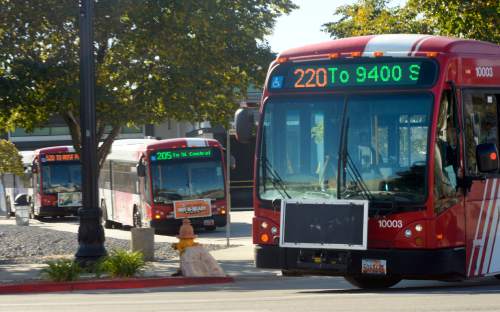This is an archived article that was published on sltrib.com in 2015, and information in the article may be outdated. It is provided only for personal research purposes and may not be reprinted.
Amid criticism over extensive executive travel, the Utah Transit Authority last year began requiring employees to gain approval from the full UTA Board in a public meeting before any international trips.
On Monday, UTA Board Chairman H. David Burton suggested that board members should also start following a similar rule — and its executive board ordered a formal policy to be drafted to require that. The board plans to review the policy next month.
"Rather than have individual board members travel willy-nilly, we [should] have a recognized process for approval," Burton said.
The 16 members of the UTA Board serve part time without salary. Many are elected mayors or county commissioners, while others are business or community leaders.
The move comes after recent controversy about UTA travel — and as voters are considering Proposition 1 to increase sales tax for transportation. Forty percent of that tax hike would go to UTA in Wasatch Front counties. Critics of Prop 1 have attacked it in part because of UTA travel and other management issues.
Despite the new travel policy for UTA employees, The Tribune reported in July that now-retired UTA President and CEO Michael Allegra failed to obtain required approval by the full board for a trip to Japan — which was canceled about the time the newspaper started inquiries about it. A board member also traveled to Japan.
Travel to Tokyo by Allegra and UTA executive Hal Johnson was not approved by the full board as policy requires, but instead by its smaller executive committee. The matter appeared on an agenda under a cryptic listing titled "Policy EL 2.3.1," with no mention that travel was to be discussed.
After a tip led The Tribune to ask UTA if Allegra and others were traveling to Tokyo, UTA spokesman Remi Barron responded, "No UTA employees are traveling to Japan."
The Tribune then used open-records laws to obtain documents related to a possible trip and found that Allegra and Johnson had planned to attend a high-speed-rail conference in Tokyo.
Barron said Allegra canceled because his mother was ill. The spokesman also said Allegra's trip was to have been paid by "a nongovernmental third party," but he declined to identify who that was.
Allegra announced his retirement in September.
Documents also showed that UTA board member Justin Allen attended the Tokyo conference in "an independent capacity." UTA registered Allen for the conference with the understanding he would reimburse the agency — which documents say he did.
Jayme Blakesley, UTA's general counsel, recommended Monday that the new travel policy for board members require them to obtain approval for any travel involving UTA business, whether they or someone else pays for it.
Earlier this year, the UTA provided a list of what it said was all UTA-paid travel by top officials and board members. One trip, however, appeared to be missing: a controversial trip to Switzerland that had included board member Chris Bleak.
Barron later explained that the omission occurred because staff members who collected the information thought then-board Chairman Greg Hughes, now the speaker of the Utah House, "was the only board member who went on that trip. Hughes paid for himself, so the trip was not listed."
The Tribune reported in February that documents showed UTA spent an average of $29,071 a month on travel during a 28-month period that ended in October 2014, down from $36,000 a month over a similar stretch of time ending in mid-2012.
Allegra and Hughes both said the new travel policy was one reason for the decline in travel.
Still, documents showed that Allegra traveled out of state on behalf of UTA 42 times in 28 months. Internationally, he jetted twice to Switzerland and once each to Germany and Montreal.
Domestically, Allegra made eight trips to Washington, D.C., six to Denver, three each to Las Vegas and Los Angeles, along with treks to Palm Springs, Calif.; New Orleans; Portland, Ore.; Seattle; New York; Philadelphia; Boston; Houston; and Atlanta, among other locales.
Hughes, as former board chairman, took 13 trips funded by UTA in the 2 ½ years before he left its board, including one to Switzerland to look at mountain transportation systems.
Twitter: @LeeHDavidson



